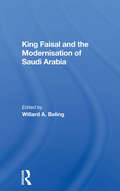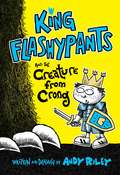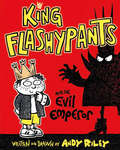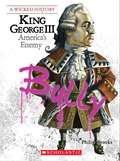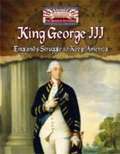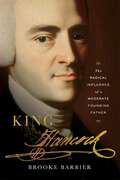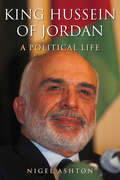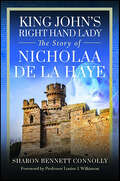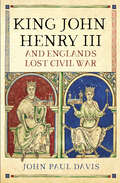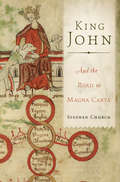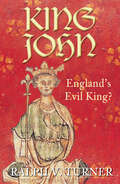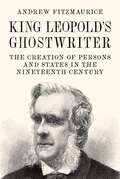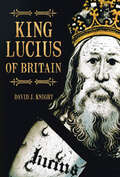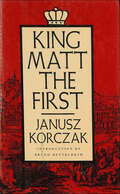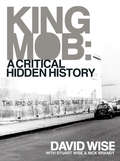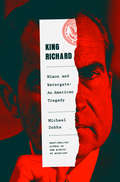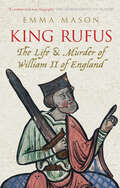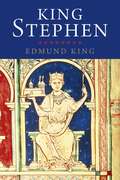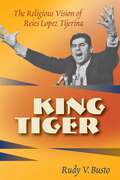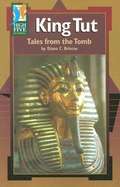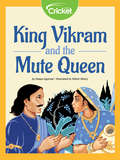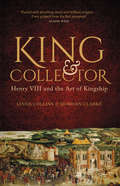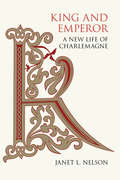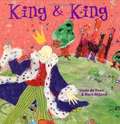- Table View
- List View
King Faisal And The Modernisation Of Saudi Arabia
by Willard A. BelingThe late King Faisal bin Abdul Aziz was born in Riyadh in 1905/6, several years after his father Abdulaziz Ibn Saud had recaptured it from Ibn Rashid. In 1964 he became king of Saudi Arabia, famous for harbouring twenty five percent of the world's oil reserves and hailed as the most powerful Arab ruler in centuries. In 1975, his nephew shot him in
King Flashypants and the Creature from Crong (King Flashypants #2)
by Andy RileySomething is frightening the people of Crong—something with long, sharp teeth, seven eyes, and an appetite for goats. The monster's name is the Voolith, and it won't stop until it has gobbled up everything in its path! When news reaches Edwinland, King Edwin decides he must cross the wilderness and defeat the Voolith in single combat. Even if he doesn't quite know what "single combat" means. This next King Flashypants adventure has it all—jousting, evil plots, mini golf, fire-breathing toads, and hilarity at every turn.
King Flashypants and the Evil Emperor
by Andy RileyEdwin isn't any ordinary boy. He is a king with a crown, his own suit of armor, a castle with secret passages and water slides—oh, and the most horribly evil man in the universe living next door. Emperor Nurbison is permanently up to no good. He wants Edwin's kingdom for himself, so when the Edwinland piggy bank runs out of money, he seizes his opportunity. None of this could possibly lead to a thrilling adventure with action, chocolate, and snappy crocodiles—could it?
King George III: America's Enemy
by Philip BrooksA children's biography of King George III, who was King of England during the American revolution.
King George III: England's Struggle to Keep America
by Steve RobertsKing George III who ruled Great Britain, is remembered as the "king who lost America". This book covers his life and reign of the British Empire.
King Hancock: The Radical Influence of a Moderate Founding Father
by Brooke BarbierA rollicking portrait of the paradoxical patriot, whose measured pragmatism helped make American independence a reality.Americans are surprisingly more familiar with his famous signature than with the man himself. In this spirited account of John Hancock’s life, Brooke Barbier depicts a patriot of fascinating contradictions—a child of enormous privilege who would nevertheless become a voice of the common folk; a pillar of society uncomfortable with radicalism who yet was crucial to independence. About two-fifths of the American population held neutral or ambivalent views about the Revolution, and Hancock spoke for them and to them, bringing them along.Orphaned young, Hancock was raised by his merchant uncle, whose business and vast wealth he inherited—including household slaves, whom Hancock later freed. By his early thirties, he was one of New England’s most prominent politicians, earning a place on Britain’s most-wanted list and the derisive nickname King Hancock. While he eventually joined the revolution against England, his ever moderate—and moderating—disposition would prove an asset after 1776. Barbier shows Hancock appealing to southerners and northerners, Federalists and Anti-Federalists. He was a famously steadying force as president of the fractious Second Continental Congress. He parlayed with French military officials, strengthening a key alliance with his hospitable diplomacy. As governor of Massachusetts, Hancock convinced its delegates to vote for the federal Constitution and calmed the fallout from the shocking Shays’s Rebellion.An insightful study of leadership in the revolutionary era, King Hancock traces a moment when passion was on the side of compromise and accommodation proved the basis of profound social and political change.
King Hussein Of Jordan: A Political Life
by Nigel AshtonA towering figure in the history of Jordan, King Hussein reigned for nearly half a century, from his grandfather's assassination in 1953 to his own death in 1999. In this fascinating biography, Nigel Ashton recounts the eventful life of the king who not only survived but flourished amidst crisis after crisis as ruler of a poor desert nation surrounded by powerful and hostile neighbors. Hussein skillfully navigated complicated relationships with the British, his fellow Arab leaders, the new bordering state of Israel, masses of dispossessed Palestinians within his kingdom, every U. S. president from Eisenhower to Clinton, and every British prime minister from Churchill to Blair. This book illuminates the private man, his key relationships, and his achievements and disappointments as a central player in the tough world of Middle Eastern politics. Ashton has had unique access to King Hussein's private papers, including his secret correspondence with U. S. , British, and Israeli leaders, and he has also conducted numerous interviews with members of Hussein's circle and immediate family. The resulting book brings new depth to our understanding of the popular and canny king while also providing new information about the wars of 1967 and 1973, President Reagan's role in the Iran-Contra affair, the evolution of the Middle East peace process, and much more.
King James VI and I and the Reunion of Christendom
by W. B. PattersonThis is a historical study of the career of King James VI and I, as king of Scotland (1567-1625) and England (1603-1625), who achieved a union of the crowns as the first king of Great Britain, and who undertook to end the recurring religious wars. His peacemaking by diplomatic means was complemented by his efforts to foster closer relations among the churches. The peace that he helped to maintain by these initiatives, though cut short by the coming of the Thirty Years' War, was immensely beneficial both to Britain and to the other countries of Europe.
King John's Right Hand Lady: The Story of Nicholaa de la Haye
by Sharon Bennett ConnollyIn a time when men fought and women stayed home, Nicholaa de la Haye held Lincoln Castle against all-comers. Not once, but three times, earning herself the ironic praise that she acted ‘manfully’. Nicholaa gained prominence in the First Baron’s War, the civil war that followed the sealing of Magna Carta in 1215. Although recently widowed, and in her 60s, in 1217 Nicholaa endured a siege that lasted over three months, resisting the English rebel barons and their French allies. The siege ended in the battle known as the Lincoln Fair, when 70-year-old William Marshal, the Greatest Knight in Christendom, spurred on by the chivalrous need to rescue a lady in distress, came to Nicholaa’s aid. Nicholaa de la Haye was a staunch supporter of King John, remaining loyal to the very end, even after most of his knights and barons had deserted him. A truly remarkable lady, Nicholaa was the first woman to be appointed sheriff in her own right. Her strength and tenacity saved England at one of the lowest points in its history. Nicholaa de la Haye is one woman in English history whose story needs to be told…
King John, Henry III and England’s Lost Civil War
by John Paul DavisIn 1204, the great Angevin Empire created by the joining of the dynasties of Henry II of England and his queen, Eleanor of Aquitaine, was fragmenting. At its height, the family landholdings had been among the largest the world had ever seen. From the border of England and Scotland in the north to south of the Pyrenees, it seemed there was nowhere in Europe destined to escape Plantagenet control. Yet within five years of his accession, King John’s grip on the family holdings was loosening. Betrayal against his father and brother, the murder of his nephew, and breaking promises made to his supporters were just some of the accusations levelled against him. When Philip II conquered Normandy, the chroniclers believed that an ancient prophecy was fulfilled: that in this year the sword would be separated from the sceptre. For the first time since 1066, England’s rule over the ancestral land was over. For John, troubles on the continent were just the beginning of a series of challenges that would ultimately define his reign. Difficult relations with the papacy and clergy, coupled with rising dissent among his barons ensured conflict would not be limited to the continent. When John died in 1216, more than half of the country was in the hands of the dauphin of France. Never had the future of the Plantagenet dynasty looked more uncertain. As the following pages will show, throughout the first eighteen years of the reign of Henry III, the future direction of England as a political state, the identity of the ruling family and the fate of Henry II’s lost empire were still matters that could have gone either way. For the advisors of the young king, led by the influential regent, William Marshal, 1st Earl of Pembroke, the effects of John’s reign would be long and severe. Successful implementation of the failed Magna Carta may have ensured his son’s short-term survival, yet living up to such promises created arguably a more significant challenge. This is the story of how the varying actions of two very different kings both threatened and created the English way of life, and ultimately put England on the path to its Lost Civil War.
King John: And the Road to Magna Carta
by Stephen ChurchKing John has long been dubbed one of the "vilest” of English kings. He was brutish, untrustworthy, and ruled as a virtual tyrant--and yet his reign changed the course of English history. As renowned medieval historian Stephen Church argues, John’s importance has for too long been overshadowed by more heroic family members like Richard the Lionhearted and Eleanor of Aquitaine. John was a skilled political manipulator, but his traditional belief in the unchecked power of the sovereign became increasingly unpopular during his reign, leading to frequent confrontations between the king and his barons. In 1215, a group of barons rebelled in response to John’s repressive fiscal policies. The peace treaty that resulted was the Magna Carta, which enshrined the king’s obligation to rule within the framework of the law. King John offers an authoritative portrait of King John and the moment that signaled the end of the age of absolute monarchy and the dawn of constitutional law.
King John: England's Evil King?
by Ralph V TurnerKing John long ago acquired the epithet 'Bad', and he is reputed to be the worst of England's kings. Before his death in 1216, his desperate exploitation of his subjects for ever more money had turned him into the mythical monster of Hollywood legend. In marked contrast to his brother Richard, John appeared incompetent in battle, failing to defend Normandy (1202-04), and was unsuccessful in recovering his lost lands in 1214. A continuing crisis was a constant need for money, forcing John to drain England of funds for campaigns in France, demanding unlawful and oppressive new taxes. Adding to his evil reputation was an ill-tempered personality and a streak of pettiness and spitfulness that led him to monstrous acts, including murdering his own nephew. King John's unpopularity culminated in a final crisis, a revolt by the English baronage, 1215-16, aimed at subjecting him to the rule of law, that resulted in his grant of Magna Carta.
King Leopold's Ghostwriter: The Creation of Persons and States in the Nineteenth Century
by Andrew FitzmauriceA dramatic intellectual biography of Victorian jurist Travers Twiss, who provided the legal justification for the creation of the brutal Congo Free StateEminent jurist, Oxford professor, advocate to the Archbishop of Canterbury, Travers Twiss (1809–1897) was a model establishment figure in Victorian Britain, and a close collaborator of Prince Metternich, the architect of the Concert of Europe. Yet Twiss&’s life was defined by two events that threatened to undermine the order that he had so stoutly defended: a notorious social scandal and the creation of the Congo Free State. In King Leopold&’s Ghostwriter, Andrew Fitzmaurice tells the incredible story of a man who, driven by personal events that transformed him from a reactionary to a reformer, rewrote and liberalised international law—yet did so in service of the most brutal regime of the colonial era.In an elaborate deception, Twiss and Pharaïlde van Lynseele, a Belgian prostitute, sought to reinvent her as a woman of suitably noble birth to be his wife. Their subterfuge collapsed when another former client publicly denounced van Lynseele. Disgraced, Twiss resigned his offices and the couple fled to Switzerland. But this failure set the stage for a second, successful act of re-creation. Twiss found new employment as the intellectual driving force of King Leopold of Belgium&’s efforts to have the Congo recognised as a new state under his personal authority. Drawing on extensive new archival research, King Leopold&’s Ghostwriter recounts Twiss&’s story as never before, including how his creation of a new legal personhood for the Congo was intimately related to the earlier invention of a new legal personhood for his wife.Combining gripping biography and penetrating intellectual history, King Leopold&’s Ghostwriter uncovers a dramatic, ambiguous life that has had lasting influence on international law.
King Lucius of Britain
by David J KnightWhile everyone knows the story of King Arthur, few will have heard of King Lucius, a figure who has been consigned to myth and largely forgotten in the annals of British history. Examining the primary sources as well as the archaeological evidence for this second century king, David Knight convincingly refutes the generally accepted view expounded at the beginning of the twentieth century that identifies Lucius as King Abgarus of Edessa. King Lucius of Britain reconstructs the story of this fascinating figure, who applied to the Pope for formal baptism in AD 177, making him the first Christian King in Britain, and traces the history of the story of Lucius, separating the myth from reality and attempting to restore this King to his rightful place in British history.
King Matt the First
by Janusz KorczakA child king introduces reforms to give children the same rights as adults.
King Mob: A Critcal Hidden History
by David Wise"I met a prostitute - Angela W - from the fishing port of Grimsby on the mouth of the Humber in the North of England. I instantly fell in love with her in an all consuming way. The pain inside my body, so massively accumulated with the death of hopes for the social revolution...was wrenched away from me as she slowly...shambled towards me." So begins Dave Wise's first hand account of King Mob, the late 60s London based political grouping formed after core members were excluded from the Situationist International. From a radical, working class perspective, Wise recounts their attempts to move "from the Situationist salon to the street", whilst frankly outlining identifying tactical, strategic and theoretical holes in the groups' day to day actions. Plans to blow up waterfalls, getting arrested on demos dressed as pantomine horses (the back end got off in court, on the grounds he didn't know what the front end was doing...), sharing oversized baked bean costumes with ultra-Maoists on Vietnam marches. Getting high and hungrily devouring Coleridge, De Quincey, Rimbaud, Marx, De Sade, Breton, Joyce and Hegel. Urinating over the lectern whilst declaring the death of art at the 1968 English Surrealist convention, being (falsely) put in the frame for the 1969 Newcastle School of Art firebombing; perhaps most infamously dressing up as Santa Claus in Selfridges toy dept, Xmas '69, and watching the chaos of consumerism unfold before them as crying children had the King Mob freely-gifted toys wrenched from their arms by employees. As the downturn of the early 1970's approached, and with it the apparent end of any hope for imminent social revolution, some of King Mob drifted off into various strands of bourgeois counterculture, whilst others faced up to the harsher realities of the "capsized utopia". Some didn't make it through, as an at times unintentionally moving epilogue here recalls. "A Critical Hidden History" is a living, breathing account of a brief moment in time, when the light got through the cracks in the wall, and a new world felt possible. As we career into the 21st century, the relevance of the playful, life affirming, non-hierarchical, anti-capitalists King Mob seems as great today as it ever did.
King Richard: Nixon and Watergate--An American Tragedy
by Michael Dobbs"Rich and kaleidoscopic… Dobbs has carved out something intimate and extraordinary, skillfully chiseling out the details to bring the story to lurid life."—Jennifer Szalai, New York Times From the best-selling author of One Minute to Midnight: a riveting account of the crucial days, hours, and moments when the Watergate conspiracy consumed, and ultimately toppled, a president.In January 1973, Richard Nixon had just been inaugurated after winning re-election in a historic landslide. He enjoyed an almost 70 percent approval rating. But by April 1973, his presidency had fallen apart as the Watergate scandal metastasized into what White House counsel John Dean called &“a full-blown cancer.&” King Richard is the intimate, utterly absorbing narrative of the tension-packed hundred days when the Watergate conspiracy unraveled as the burglars and their handlers turned on one another, exposing the crimes of a vengeful president.Drawing on thousands of hours of newly-released taped recordings, Michael Dobbs takes us into the heart of the conspiracy, recreating these traumatic events in cinematic detail. He captures the growing paranoia of the principal players and their desperate attempts to deflect blame as the noose tightens around them. We eavesdrop on Nixon plotting with his aides, raging at his enemies, while also finding time for affectionate moments with his family. The result is an unprecedentedly vivid, close-up portrait of a president facing his greatest crisis.Central to the spellbinding drama is the tortured personality of Nixon himself, a man whose strengths, particularly his determination to win at all costs, become his fatal flaws. Rising from poverty to become the most powerful man in the world, he commits terrible errors of judgment that lead to his public disgrace. He makes himself—and then destroys himself.Structured like a classical tragedy with a uniquely American twist, King Richard is an epic, deeply human story of ambition, power, and betrayal.
King Rufus: The Life and Murder of William II of England
by Emma MasonThe future William II was born in the late 1050s the third son of William the Conqueror. The younger William, - nicknamed Rufus because of his ruddy cheeks - at first had no great expectations of succeeding to the throne. This biography tells the story of William Rufus, King of England from 1087-1100 and reveals the truth behind his death.
King Stephen
by Edmund KingThis compelling new biography provides the most authoritative picture yet of King Stephen, whose reign (1135-1154), with its "nineteen long winters" of civil war, made his name synonymous with failed leadership. After years of work on the sources, Edmund King shows with rare clarity the strengths and weaknesses of the monarch. Keeping Stephen at the forefront of his account, the author also chronicles the activities of key family members and associates whose loyal support sustained Stephen's kingship. In 1135 the popular Stephen was elected king against the claims of the empress Matilda and her sons. But by 1153, Stephen had lost control over Normandy and other important regions, England had lost prestige, and the weakened king was forced to cede his family's right to succession. A rich narrative covering the drama of a tumultuous reign, this book focuses well-deserved attention on a king who lost control of his destiny.
King Tiger: The Religious Vision of Reies Lípez Tijerina
by Rudy V. BustoRight now we look like a cricket. What is a cricket? King of the Insects; a little, tiny animal. All the cricket can do is [say] 'cricket, cricket, cricket.' Just a noise, that's all. But you know, if that cricket gets in the ear of the lion and scratches inside, there is nothing the lion can do. There is nothing; there is no way the lion can use his claws and jaws to destroy the cricket. The more the lion scratches himself the deeper the cricket goes. . . .--Reies López Tijerina, 1971Throughout his career in New Mexican land grant politics, Reies Tijerina frequently used this fable to inspire persistence in the face of impossible odds. As the leader of a grassroots Hispano land rights organization, the Alianza Federal de Mercedes Reales (The Federal Alliance of Land Grants), Tijerina has made an indelible imprint on New Mexico's Hispano culture. King Tiger details Tijerina's life and efforts--those real, rumored, and mythologized--in the first systematic study of the origin of his political ideas. Rudy Busto shows how one of Tijerina's particularly powerful mystical visions led him to northern New Mexico to fight to restore land to those who lost it during various nineteenth-century land grant title conflicts. More than three decades after the infamous Tierra Amarilla County courthouse raid, Tijerina remains an important touchstone for all New Mexicans. In his life and activism are found the interdependent issues of land, water, language, economic development, sovereignty, political power, and rights to cultural formation in the Southwest.
King Tut: Tales From the Tomb
by Diana C. BriscoeReaders of all ability levels will want to read these high-low books from 5 high-interest nonfiction subject areas: sports, history, biography, adventure, and science. Each easy-to-read book explores a fascinating narrative account of the subject. This all-new series features historical photographs, full-color graphics, glossary words on each page, and a contemporary chapter-book format. Copyright © Libri GmbH. All rights reserved.
King Vikram and the Mute Queen
by Deepa AgarwalKing Vikram loves his subjects and will do anything to make them happy—even if it means trying to convince a mute queen to marry one of them! Will he succeed?
King and Collector: Henry VIII and the Art of Kingship
by Siobhan Clarke Linda CollinsNo English king is as well-known to us as Henry VIII: famous for six marriages; for dissolving the monasteries; and for the ruthless destruction of those who stood in his way. But Henry was also an ardent patron of the arts whose tapestries and paintings, purchased in pursuit of glory and magnificence, adorned his lavish court and began the Royal Collection. In contrast to later royal collectors, this king was more interested in storytelling than art for its own sake, and all his commissions relate to one central tale: the glorification of Henry and his realm. His life can be seen through his art collection and the works tell us much about both his kingship and his insecurities. King and Collector tells a unique story of art, power and propaganda in Tudor England.
King and Emperor: A New Life of Charlemagne
by Janet L. Nelson"King and Emperor takes on the compelling suspense of good detective work as well as good history."—The Wall Street Journal Charles I, often known as Charlemagne, is one of the most extraordinary figures ever to rule an empire. Driven by unremitting physical energy and intellectual curiosity, he was a man of many parts, a warlord and conqueror, a judge who promised "for each their law and justice," a defender of the Latin Church, a man of flesh and blood. In the twelve centuries since his death, warfare, accident, vermin, and the elements have destroyed much of the writing on his rule, but a remarkable amount has survived. Janet Nelson's wonderful new book brings together everything we know about Charles I, sifting through the available evidence, literary and material, to paint a vivid portrait of the man and his motives. Building on Nelson’s own extraordinary knowledge, this biography is a sort of detective story, prying into and interpreting fascinating and often obdurate scraps of evidence, from prayer books to skeletons, gossip to artwork. Charles’s legacy lies in his deeds and their continuing resonance, as he shaped counties, countries, and continents; founded and rebuilt towns and monasteries; and consciously set himself up not just as King of the Franks, but as the head of the renewed Roman Empire. His successors—even to the present day—have struggled to interpret, misinterpret, copy, or subvert his legacy. Janet Nelson gets us as close as we can hope to come to the real figure of Charles the man as he was understood in his own time.
King and King
by Stern Nijland Linda De HaanWhen the queen insists that the prince get married and take over as king, the search for a suitable mate does not turn out as expected.
